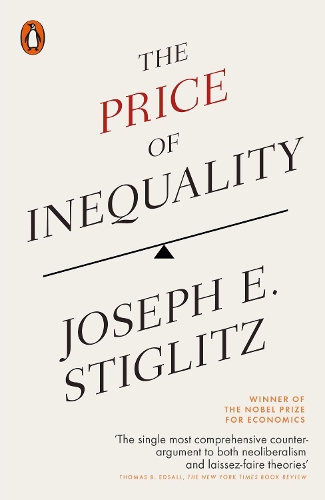
The Price of Inequality
(Paperback)
Publishing Details
The Price of Inequality
By (Author) Joseph E. Stiglitz
Penguin Books Ltd
Penguin Books Ltd
14th June 2013
8th April 2013
United Kingdom
Classifications
Tertiary Education
Non Fiction
Political science and theory
339.20973
Physical Properties
Paperback
592
Width 130mm, Height 198mm, Spine 26mm
407g
Description
Nobel Laureate Joseph Stiglitz explains why we are experiencing such destructively high levels of inequality - and why this is not inevitable Nobel Laureate Joseph Stiglitz explains why we are experiencing such destructively high levels of inequality - and why this is not inevitable The top 1 percent have the best houses, the best educations, the best doctors, and the best lifestyles, but there is one thing that money doesn't seem to have bought- an understanding that their fate is bound up with how the other 99 percent live. Throughout history, this is something that the top 1 percent eventually do learn - too late. In this timely book, Joseph Stiglitz identifies three major causes of our predicament- that markets don't work the way they are supposed to (being neither efficient nor stable); how political systems fail to correct the shortcomings of the market; and how our current economic and political systems are fundamentally unfair. He focuses chiefly on the gross inequality to which these systems give rise, but also explains how inextricably interlinked they are. Providing evidence that investment - not austerity - is vital for productivity, and offering realistic solutions for levelling the playing field and increasing social mobility, Stiglitz argues that reform of our economic and political systems is not just fairer, but is the only way to make markets work as they really should. Joseph Stiglitz was Chief Economist at the World Bank until January 2000. He is currently University Professor of the Columbia Business School and Chair of the Management Board and Director of Graduate Summer Programs, Brooks World Poverty Institute, University of Manchester. He won the Nobel Prize for Economics in 2001 and is the best-selling author of Globalization and Its Discontents, The Roaring Nineties, Making Globalization Work and Freefall, all published by Penguin.
Reviews
The single most comprehensive counterargument to both Democratic neoliberalism and Republican laissez-faire theories. While credible economists running the gamut from center right to center left describe our bleak present as the result of seemingly unstoppable developments--globalization and automation, a self-replicating establishment built on "meritocratic" competition, the debt-driven collapse of 2008--Stiglitz stands apart in his defiant rejection of such notions of inevitability. He seeks to shift the terms of the debate. --Thomas B. Edsall
Author Bio
Joseph Stiglitz was Chief Economist at the World Bank until January 2000. He is currently University Professor of the Columbia Business School and Chair of the Management Board and Director of Graduate Summer Programs, Brooks World Poverty Institute, University of Manchester. He won the Nobel Prize for Economics in 2001 and is the best-selling author of Globalization and Its Discontents, The Roaring Nineties, Making Globalization Work, Freefall, The Price of Inequality, The Great Divide, and his latest, The Euro, all published by Penguin.
